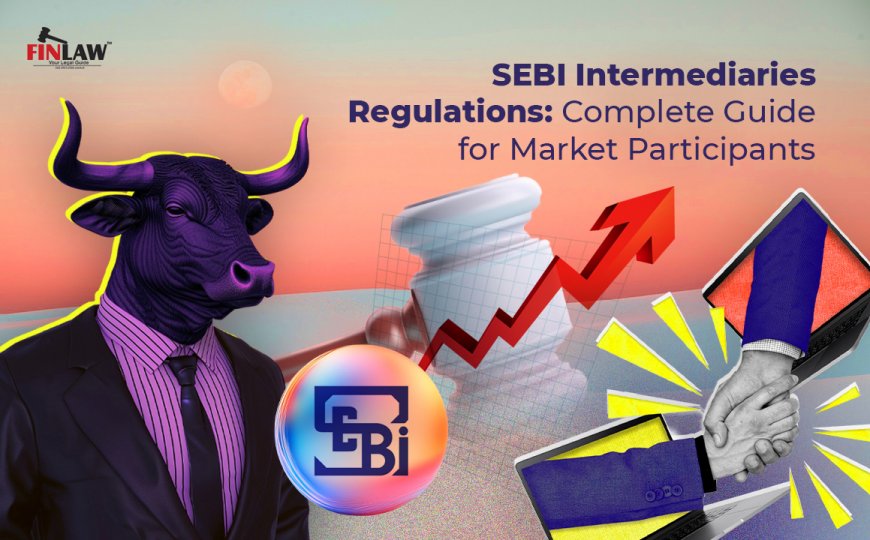SEBI Intermediaries Regulations: Complete Guide for Market Participants in India
Discover a complete guide on SEBI Intermediaries Regulations, covering registration, compliance, penalties, and recent updates for market participants.

In a rapidly evolving securities market like India, robust governance mechanisms are essential to ensure fairness, transparency, and investor protection. The Securities and Exchange Board of India (SEBI) plays a crucial role in this framework by regulating various market participants through a well-defined set of rules known as the SEBI Intermediaries Regulations.
This article offers a comprehensive and updated guide to SEBI Intermediaries Regulations, outlining their scope, significance, compliance mandates, amendments, and what they mean for different types of market intermediaries operating in India.
What Are SEBI Intermediaries?
SEBI intermediaries are entities authorized to facilitate participation in India’s securities market. Their activities bridge the gap between issuers of securities and investors, ensuring that the market functions smoothly and efficiently.
Major Categories of SEBI Intermediaries
Under the SEBI Intermediaries Regulations, entities required to register with SEBI include:
-
Stockbrokers and Sub-brokers
-
Investment Advisers
-
Merchant Bankers
-
Underwriters
-
Portfolio Managers
-
Mutual Funds and AMCs
-
Research Analysts
-
Credit Rating Agencies
-
Custodians of Securities
-
Registrars and Share Transfer Agents
-
Depositories and Depository Participants
-
Bankers to an Issue
-
Debenture Trustees
-
Alternative Investment Fund (AIF) Managers
Each category has its own registration and compliance requirements under the umbrella of SEBI (Intermediaries) Regulations, 2008.
Understanding SEBI (Intermediaries) Regulations, 2008
The SEBI Intermediaries Regulations, 2008, were implemented to create a consolidated legal structure governing the registration, supervision, and disciplinary control of intermediaries.
Key Objectives
-
Ensure uniform and consistent treatment of all SEBI-registered intermediaries.
-
Establish clear procedures for registration, inspection, and disciplinary action.
-
Enhance investor confidence through transparency and integrity in operations.
These regulations are designed to maintain high professional standards, promote market integrity, and minimize systemic risk.
SEBI Intermediaries Registration Process
To operate legally, all market participants categorized as intermediaries must undergo SEBI’s registration process:
1. Application Submission
Applicants must fill the relevant form under the applicable regulation and submit supporting documents, including:
-
Business model and structure
-
KYC compliance measures
-
Details of key personnel
2. “Fit and Proper” Criteria
Applicants are assessed based on:
-
Integrity and honesty
-
Absence of criminal proceedings
-
Financial capability to carry out operations
-
Technical infrastructure and manpower
3. SEBI Review and Grant of Certificate
If found eligible, SEBI grants a Certificate of Registration, subject to terms and conditions.
4. Post-Registration Obligations
Registered intermediaries must:
-
Submit quarterly and annual returns
-
Disclose financials and operational changes
-
Maintain audit trails and transaction records
Non-compliance with SEBI intermediaries regulations can result in monetary penalties, suspension, or cancellation of the certificate.
Recent Amendments to SEBI Intermediaries Regulations
To stay relevant to market needs, SEBI continuously updates the intermediary regulations. Here are the latest amendments you should know:
Fast-Track Disciplinary Actions (2024 Amendment)
Regulation 30A empowers SEBI to adopt summary proceedings for minor and straightforward violations, allowing quicker resolution and less administrative burden.
Delegation of Power (Regulation 24 Update)
SEBI has now authorized senior officers—not just whole-time members—to initiate disciplinary action. This leads to faster enforcement and better resource utilization.
Social Media Compliance (2025 Circular)
With growing digital investment promotions, SEBI requires:
-
Intermediaries to register official contact details with platforms
-
Mandatory verification of financial advertisements on social media
This measure ensures accountability and reduces the risk of misinformation.
Enhanced Role of Compliance Officers
Compliance officers now have more defined roles, such as:
-
Ensuring periodic audits
-
Reporting serious lapses to SEBI
-
Educating employees on evolving SEBI regulations
Obligations of SEBI-Registered Intermediaries
Once registered, intermediaries must strictly follow conduct norms prescribed by SEBI:
|
Obligation |
Description |
|
Code of Conduct |
Fair treatment of clients, conflict-free advice, no misrepresentation |
|
Risk Disclosures |
Proper documentation of investment risks and disclaimers |
|
Client Confidentiality |
Secure storage and non-disclosure of investor information |
|
Internal Compliance Systems |
Appoint compliance officers, internal audits, grievance redressal |
|
Anti-Money Laundering (AML) |
KYC adherence, reporting suspicious transactions |
|
Periodic Reporting |
Timely submission of returns, financials, audit findings |
Penalties for Non-Compliance
If intermediaries violate any provisions of SEBI Intermediaries Regulations, the regulator may take any of the following actions:
-
Issue warnings or show-cause notices
-
Impose monetary fines
-
Suspend or cancel registration certificates
-
Disgorgement of profits made through illegal means
-
Initiate criminal prosecution in severe cases
Appeal Process Under SEBI Intermediaries Regulations
Entities aggrieved by SEBI’s decision can appeal to the Securities Appellate Tribunal (SAT) under Section 15T of the SEBI Act.
If dissatisfied with the SAT order, a further appeal can be filed with the High Court or Supreme Court, depending on jurisdiction and subject matter.
Benefits of Complying with SEBI Intermediaries Regulations
Compliance is not just a legal requirement—it brings substantial advantages:
-
Enhanced Market Reputation
-
Increased Trust Among Investors
-
Ease of Collaboration with Institutions
-
Lower Risk of Litigation or Penalties
-
Eligibility for Expansion or New Licenses
In India’s competitive capital market, regulatory compliance is a major differentiator for long-term success.
Best Practices for Staying Compliant
Here’s how intermediaries can ensure ongoing compliance:
-
Subscribe to SEBI circular updates
-
Conduct quarterly internal audits
-
Maintain digital audit trails
-
Use SEBI-approved software for transaction recording
-
Train all staff on compliance and ethics
SEBI Intermediaries Regulations and Fintech Startups
With India’s fintech revolution, many new platforms are entering the securities space. Whether it's a robo-advisory app, online brokerage, or digital research platform, these startups must determine whether their model qualifies as an intermediary and register accordingly.
Pro tip:
Always consult with a SEBI compliance consultant before launching any fintech platform that deals with investor data or market transactions.
Conclusion
The SEBI Intermediaries Regulations serve as a vital tool for governing India’s capital markets. They not only ensure the orderly functioning of market participants but also promote fairness, accountability, and investor protection.
Whether you are a traditional brokerage firm or a modern-day fintech innovator, understanding and complying with SEBI’s intermediary framework is essential for sustained growth and regulatory safety.
Frequently Asked Questions (FAQs)
Q1. What is the primary legislation governing SEBI intermediaries?
The SEBI (Intermediaries) Regulations, 2008, govern registration, conduct, and enforcement of SEBI-registered intermediaries.
Q2. Who needs to register under SEBI Intermediaries Regulations?
Any entity that deals with investor funds or market transactions, such as brokers, advisors, custodians, credit rating agencies, etc.
Q3. Is it mandatory for fintechs to register as intermediaries?
Yes, if the fintech performs regulated functions like investment advice, research, or brokerage services.
Q4. What are the penalties for non-compliance?
Penalties range from monetary fines and warnings to suspension or cancellation of registration.
What's Your Reaction?



















